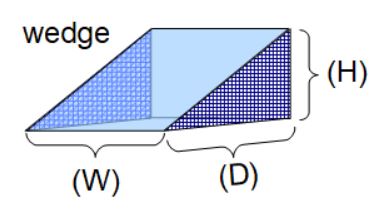Wedge Surface Area
The Surface Area of a Wedge calculator computes the surface area of a wedge shaped object based on its dimensions.
INSTRUCTIONS: Choose units and enter the following:
- (H) Height
- (W) Width
- (D) Depth
Wedge Surface Area (A): The calculator returns the area in square centi-meters. However, this can be automatically converted to compatible units (e.g., square inches or feet) via the pull-down menu.
The Math / Science
A wedge is geometrically a three dimensional triangle with triangular ends. The formula for the surface area of a wedge is:
`A = (D * H) + (D*W) + (W*H) + (sqrt(D^2+H^2)*W)`
where
- A = Surface Area of the Wedge
- W = Width
- D = Depth
- H = Height
A wedge is a three-dimensional geometric shape that has a right - triangular cross-section with a 90o corner and typically tapers from a thick end to a thin edge. It can be thought of as a prism with a triangular base, where one face is slanted, forming an inclined plane. It has five sides.
Properties of a Wedge Shape:
- Base: Typically a rectangle or a parallelogram.
- Sides: At least one slanted face, usually a triangle.
- Edges: The meeting points of the faces create sharp edges, often leading to a thin end.
- Angles: The wedge often has an acute angle at one end and a broader face at the other.
Examples of Wedges in Real Life:
- Tools: Axe heads, chisels, doorstops.
- Natural Forms: Some rock formations and ice wedges.
- Engineering: Airplane wings and hydrofoils have wedge-like cross-sections for aerodynamics
Wedge Calculators
- Comments
- Attachments
- Stats
No comments |

